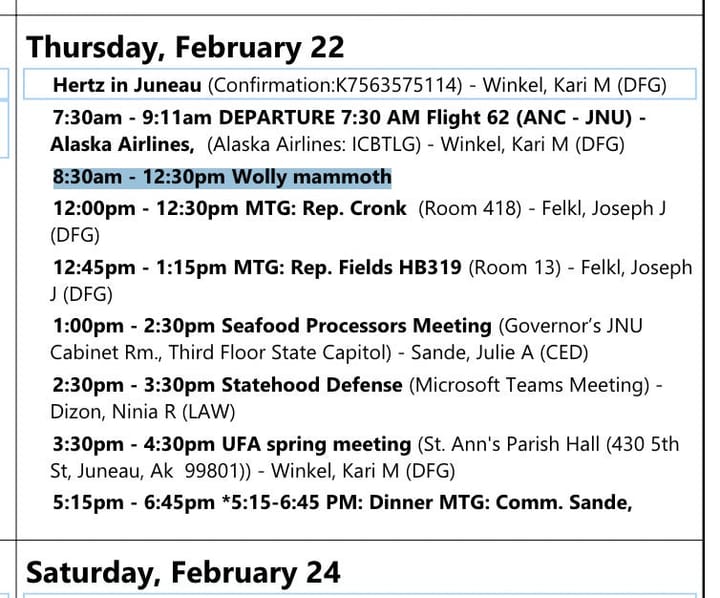Interesting stuff: a guilty plea in Kachemak Bay seaplane case, a state contract for McKinsey and Dunleavy's revived pro-family efforts
Plus: an array of stakeholders weigh in on Anchorage's electric utility's proposal to raise rates, AIDEA pays $500,000 for road data and Dunleavy gets a new press aide.

This edition of Northern Journal is sponsored by The Boardroom, a shared workspace in Anchorage. I use their array of comfy and light-filled spaces as an alternative to my home office, and I also enjoy the free kombucha and convenient access to downtown. Check out membership options here.

Northern Journal is a reader-supported publication. To receive new posts and support my work, consider becoming a free or paid subscriber.
Good morning, and welcome back to Northern Journal. I took a break earlier this month, but now I’m back in full force for the fall, with some fun stories on my agenda.
This edition of Interesting Stuff covers subjects including a plea deal in a high-profile criminal case; a contract between Republican Gov. Mike Dunleavy’s administration and the consulting firm McKinsey & Company; an array of stakeholders intervening in a case involving Anchorage’s electric utility’s proposed price increase; and a half-million dollars in spending on the West Su Access project by the Alaska Industrial Development and Export Authority, or AIDEA.
Stay tuned for upcoming stories on fisheries, the Cook Inlet natural gas shortage and other subjects. Thanks for reading.
After Kachemak Bay seaplane incident, restaurant owner takes plea deal with steep fine
A Kachemak Bay restaurant owner and artist who faced federal charges after allegedly harassing a seaplane with a boat will pay a $25,000 fine under a plea deal with prosecutors, according to documents filed last week.
Marian Tillion Beck, founder and owner of the Saltry Restaurant in Halibut Cove, was charged earlier this year after a viral video showed her operating a boat that repeatedly veered in front of the seaplane, which was carrying passengers for a bear viewing and sightseeing tour.
Beck will plead guilty to one of the two charges in the case, gross negligent operation of a vessel, while the other charge of attempted destruction of aircraft will be dismissed, according to the agreement, which still must be approved by a judge.
Beck will pay the fine and also relinquish her mariner’s license to the U.S. Coast Guard, according to the terms of the 16-page agreement, which was filed Thursday. She owns a ferry boat, the Danny J, that carries restaurant customers from Homer across the bay to the Saltry.
Dunleavy administration hires McKinsey and Co. to draft energy pitch
Alaska Republican Gov. Mike Dunleavy’s administration hired global consulting firm McKinsey and Company earlier this year to help pitch investors on the state's oil, gas and new energy resources.
The Department of Revenue, led by Commissioner Adam Crum, signed the contract in May, a few days before Dunleavy’s yearly Sustainable Energy Conference.
The deal called for McKinsey to draft an "elevator pitch" for investors on Alaska’s oil and gas, liquefied natural gas and "new energies markets," according to a copy of the contract and related documents, which were released in response to a Northern Journal public records request.
The contract, capped at $100,000, was geared toward messaging at the conference, according to the documents. A McKinsey partner, Kassia Yanosek, moderated a session at the conference that featured Dunleavy.
McKinsey has been criticized in recent years for its work with opioid manufacturers, cigarette producers and Chinese state-owned companies. The Dunleavy administration hired the firm on a no-bid basis, because of what officials described as its unique qualifications to perform the work, according to the documents.
Crum, the revenue commissioner, couldn’t be reached for comment.
AIDEA buys nearly $500,000 in West Su Access data from law firm
Alaska’s state-owned economic development agency spent nearly half a million dollars to buy data to help advance a proposed road project that would provide access to mining deposits and other areas on the largely undeveloped west side of the Susitna River.
The Alaska Industrial Development and Export Authority, or AIDEA, agreed to pay $490,000 to a law firm, Holmes Weddle & Barcott, to buy data "pertaining to the West Su Access Road Project," according to copies of purchase orders released to Northern Journal last month.
The data, which covers wetlands and water information along with "cultural fieldwork," was gathered by an unidentified "third party," according to the documents.
An AIDEA spokeswoman, Josie Wilson, didn’t respond to a request for comment about the purchase. Stacey Stone, the attorney listed on the purchasing documents as the contact at the law firm, declined to identify the third party.
AIDEA and Dunleavy’s administration have been advancing the West Su project in part to provide access to mineral deposits under development by a Canadian company, U.S. GoldMining, and an Australian company, Nova Minerals.
The project also has support from a lodge owner in the remote settlement of Skwentna and a leader of the Alaska Outdoor Council, a sportsmen’s group. But it’s opposed by other remote lodge owners and conservation groups, who say it would damage salmon habitat and alter the area’s undeveloped character.
Companies, advocacy groups will weigh in on Anchorage electric utility’s proposed rate hike
An array of advocacy groups, utilities and other entities have moved to formally join the ongoing case in which Anchorage’s big electric utility is seeking approval from state regulators to raise its prices some 6%.
In the past several weeks, roughly a dozen stakeholders filed petitions to intervene in Chugach Electric Association’s proposal before the Regulatory Commission of Alaska, known as a rate case.
The intervenors include multiple property companies represented by Anchorage attorney Robin Brena; the University of Alaska Anchorage and U.S. Department of Defense; other utilities such as Fairbanks-based Golden Valley Electric Association and Homer Electric Association; and advocacy groups such as AARP and Renewable Energy Alaska Project, or REAP, whose attorneys in the case work for Earthjustice, the environmental law firm.
Ethan Schutt, an attorney who chairs the Alaska Permanent Fund Corp.’s board of trustees, has also filed a petition to intervene as an individual Chugach member and ratepayer.
The regulatory commission, whose members are appointed by Dunleavy, is responsible for considering Chugach’s request, filed in June, to raise its rates.
Chugach, a cooperative, is Alaska's biggest electric utility and has some 90,000 members. Its activities are drawing increasing scrutiny as urban Alaska contends with a looming natural gas shortage and efforts to shift electricity production away from fossil fuels — which currently generate some 80% of Chugach’s power.
A Chugach spokeswoman, Julie Hasquet, declined to comment, saying the utility will limit its responses to formal proceedings before the commission. It has filed documents indicating that it will not oppose any of the petitions to intervene.
Dunleavy revives “family and life” website and policies, hires new deputy press secretary
Dunleavy is reviving efforts to grow Alaska’s population and boost economic development, several months after the deputy he hired to run that program resigned amid news he’d made racist and sexist comments on a podcast that he co-hosts.
Dunleavy last month hired two new contractors to advance his “family and life” agenda. One of them, Idaho-based SpinUp Creative, will be paid up to $10,000 to design a web page for "Strong Families — Strong Alaskans," according to its contract.
The other contractor, Anchorage-based polling firm Dittman Research, will be paid up to $21,500 to survey Alaskans and report back to the governor's office and state health department as part of an effort "to better understand the considerations, motivations and barriers that Alaskans encounter when deciding to start or grow a family within the state," according to its contract.
The two contracts appear to restart efforts that were sidelined when Dunleavy’s pro-family policy advisor, Jeremy Cubas, resigned earlier this year.
Cubas was developing a pro-family website when my reporting for Alaska Public Media and APM Reports revealed that Cubas had defended Adolf Hitler's views, boasted about using racial slurs and advocated for violence against transgender activists.
A Dunleavy spokesman, Jeff Turner, declined to comment on the new contracts.
Dunleavy has also hired a new press secretary, Jessica Pace Bowers.
Bowers’ hiring comes after the departure of Shannon Mason, who left the job to work for Democratic U.S. Rep. Mary Peltola.
Bowers previously worked in communications jobs for Covenant House Alaska and SkyWest Airlines, according to her LinkedIn profile. She is not registered with a political party, according to a state voter registration database.
Ranked choice voting critic files campaign finance complaint against supporters
One of the leaders of the group seeking to repeal ranked choice voting and open primaries in Alaska has filed a campaign finance complaint against the group defending the new system, first used in elections last year.
Phillip Izon, one of the sponsors of the proposed initiative to repeal the new election system, filed the 16-page complaint last week. It alleges that Alaskans for Better Elections, the group defending the new system, has violated campaign finance laws.
Alaskans for Better Elections has filed its own complaint accusing Izon and his own allies of breaking the same campaign finance laws. Last month, staff at the Alaska Public Offices Commission said in response to Alaskans for Better Elections’ complaint that Izon’s allies had, in fact, operated illegally.
Izon, who’s working with an array of politically conservative activists, is being represented by Kevin Clarkson, the former Alaska attorney general.
Northern Journal is a newsletter written by me, Anchorage journalist Nat Herz. It’s free to subscribe, and stories are also free to Alaska news outlets to republish through a partnership with the Alaska Beacon.
My goal is reaching the broadest possible audience of Alaskans. But if you can afford it, please consider supporting my work with a $100 annual or $10 monthly voluntary paid membership — these are currently my only sources of revenue for this project. Your support allows me to stay independent and untethered to the demands of the day-to-day news cycle. If you’ve already subscribed, thank you.



